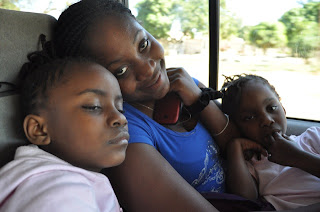Wednesday, August 25, 2010
Stayin'
We have received confirmation from the State Dept. that you have been approved to renew your Fellowship projects for a second cycle. This is to let you know that we have you confirmed as renewals. However, we will not be sending official acceptance letters, new Fellowship documents for you to complete, or your new grants until mid-October. In the meantime, please let me know if you have any questions.
Best,
Erin
Wednesday, August 18, 2010
Akisha is Online!

Once it's added to the website, your essay will appear at...
http://thisibelieve.org/essay/78824/
You will notice that only your first name will be seen on the web page with your essay. We do not publish last names or other personal information on our website. The only exceptions to this rule are essayists who have granted permission for use of their last name or essayists from the original 1950s series.
We are honored by your having shared your most closely held convictions with us. Thank you, sincerely, for participating in our project.
-- The staff of This I Believe
This I believe
By Akisha Pearman
As an English language teacher I believe words are the most powerful tool to which I can expose my students. I have held words close to my heart since I was young, not verbalizing them, but writing my observations in a journal. My words always meant exactly how I wrote them. I was the only one who had to interpret them so there was no need for cross-cultural communication.
My family moved around a lot when I was young. It took a while to make friends but I think all the moving made me into a skilled observer of my surroundings. I was quiet, but in my silence I was soaking in all the feelings, interactions, and communication styles of others. I think this prepared me for intercultural experiences later in my life abroad in Spain, Madagascar, Mozambique, Korea, and now Angola. It made me sensitive to the way people use language and culture to communicate.
When I taught English in Korea I was placed at a girls’ catholic school. I was also there to do professional development activities for the English teachers as well as give English conversation classes to teachers of other disciplines. These other teachers and I learned a lot from each other that semester—speaking about challenges in teaching, what we considered about certain life issues, and discussing photographs and artwork in a way they had never done before in a language class. As high beginners, they surprised me as well as themselves by what they were able to communicate with me and each other with limited words.
One day, after class had finished, I was packing up my materials and noticed that one of the sweet nuns had accidently picked up my favorite pen and was carrying it out of class. With a warm smile, I sarcastically told her, “I think you stole my pen.” Her eyes opened wide in embarassment, she smiled back, gave me the pen, and we walked to our offices together. I didn’t give the mistake another thought until she stopped showing up for class.
It took three weeks for that sweet student nun to gather the courage to talk to me about what had happened through a translator. During the encounter she said that after hearing that word “stole” she looked it up and came upon words like “thief,” “burglar,” “shoplift” and many other words that were “inappropriate” to use with a nun. She belonged to the church and because of this it was an insult to talk to her this way.
I went through a lot of emotions after talking with her. I felt like a complete idiot, was angry that she didn’t understand sarcasm, and was hurt that she could fathom I would speak to her disrespectfully. Language brought us to an understanding that day: Words can be used to inform people about the world and expand their knowledge of it. They can make communication (and miscommunication) possible. They can be used to improve lives and relationships.
Sunday, August 15, 2010
Sunday, August 8, 2010
Senhora do Monte Procession
Saturday, August 7, 2010
My Favorite Pictures until now












Wednesday, August 4, 2010
Beauty in Every Situation
 So, I must begin this by talking about how frustrating it is to have a blog sometimes. If you haven't heard from the grapevine, I am very lonely in Angola. I am LOVIN' the professional experiences I am having. I get to do cool things with teachers and students of English, get to travel a bit, and I think these experiences will only help me in the future. Perhaps one day I can use the skills to work with the State department managing their english programs around the globe, who knows? Being lonely, coupled with the fact that my internet connection is not fast enough to Skype call people for longer than a minute before it cuts off, make the need to connect to something when good and bad things happen, so imperative. However, this means of communication, my blog, can't be a substitute for a dinner chat with my family, a coffee or drink with an old friend, or a barstool bitching session with a group of old traveling buddies. Lots of different parties have this blog address--my bosses, my current and former students, so I constantly censor or edit what I am writing about. I have to be very careful about how I say things as well as to not piss somebody off. This is not so great for my spirit so I do pray a lot to have some form of release, but I am frustrated nonetheless. I was talking to my little sister during my last visit and she made a comment about how me and my mom and her were pretty strong women. I think lots of people see me as strong because I am able to live so far away and have been living by myself for so long. I reminded her that those who appear strong, in my experience, are the ones who are the most hurt inside. In all my travels I have always had some option for communication--other American Peace Corps Volunteers, a kind friend from a foreign land (not the country I was living in) for nice talks, or just a DSL internet connection and a Skype-In number. This is my first experience with none of these things and God is the only thing left. Think he's trying to tell me something?? :)
So, I must begin this by talking about how frustrating it is to have a blog sometimes. If you haven't heard from the grapevine, I am very lonely in Angola. I am LOVIN' the professional experiences I am having. I get to do cool things with teachers and students of English, get to travel a bit, and I think these experiences will only help me in the future. Perhaps one day I can use the skills to work with the State department managing their english programs around the globe, who knows? Being lonely, coupled with the fact that my internet connection is not fast enough to Skype call people for longer than a minute before it cuts off, make the need to connect to something when good and bad things happen, so imperative. However, this means of communication, my blog, can't be a substitute for a dinner chat with my family, a coffee or drink with an old friend, or a barstool bitching session with a group of old traveling buddies. Lots of different parties have this blog address--my bosses, my current and former students, so I constantly censor or edit what I am writing about. I have to be very careful about how I say things as well as to not piss somebody off. This is not so great for my spirit so I do pray a lot to have some form of release, but I am frustrated nonetheless. I was talking to my little sister during my last visit and she made a comment about how me and my mom and her were pretty strong women. I think lots of people see me as strong because I am able to live so far away and have been living by myself for so long. I reminded her that those who appear strong, in my experience, are the ones who are the most hurt inside. In all my travels I have always had some option for communication--other American Peace Corps Volunteers, a kind friend from a foreign land (not the country I was living in) for nice talks, or just a DSL internet connection and a Skype-In number. This is my first experience with none of these things and God is the only thing left. Think he's trying to tell me something?? :)The Benguela "drive by" 3 Hour Workshop

Tuesday, August 3, 2010
Mombaka

Monday, August 2, 2010
Sunday, August 1, 2010
Visit with Anacleto's Family !!!!!!!!!





















